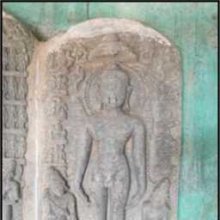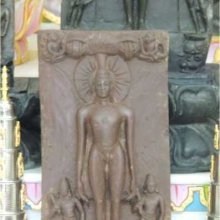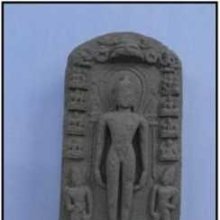Vasupujya, Vasupūjya, Vāsupūjya: 9 definitions
Introduction:
Vasupujya means something in Jainism, Prakrit, Hinduism, Sanskrit. If you want to know the exact meaning, history, etymology or English translation of this term then check out the descriptions on this page. Add your comment or reference to a book if you want to contribute to this summary article.
Images (photo gallery)
In Jainism
General definition (in Jainism)
Source: Wisdom Library: Jainism1) Vāsupūjya (वासुपूज्य):—The twelfth Tīrthaṅkara (Janism recognizes 24 such teachers or Siddhas). He is also known as Vāsupūjyanātha. His colour is gold (kāñcana), according to Aparājitapṛcchā (221.5-7). His height is 70 dhanuṣa (a single dhanuṣa (or, ‘bow’) equals 6 ft), thus, roughly corresponding to 128 meters. His emblem, or symbol, is a Buffalo.
Vāsupūjya’s father is Vasupūjya and his mother is Jayā according to Śvetāmbara or Vijayā according to Digambara. It is an ancient Jain practice to worship the Tīrthaṅkara’s parents in various rites, such as the pratiṣṭhāvidhi, according to the Ācāradinakara (14th century work on Jain conduct written by Vardhamāna Sūri).
2) Vasupūjya (वसुपूज्य) is the father of Vāsupūjya.
Source: archive.org: The Jaina IconographyVāsupūjya (वासुपूज्य) refers to the twelfth of twenty-four Tīrthaṃkaras or Jinas, commonly depicted in Jaina iconography.—The emblem constantly associated with Vāsupūjya, as wegather from Jaina books, is the buffalo. The other characteristics of his image viz. the Śāsanadeva and the Śāsanadevī are known by the names of Kumāra and Caṇḍā (Digambara: Gāndhārī). The tree which gave him shade while acquiring the Kevala knowledge is Pāṭalika according to the Abhidhānacintāmaṇi and Kadamba according to the Uttarapurāṇa. A King named Darpiṣṭa-Vāsudeva is to wave the Chowri or the fly-fan by his side.
From Jaina sources, we gather that his father named Vasupūjya was a Kṣatriya prince of Ikṣvāku race. His mother is called Jayāvatī. Campāpurī (Modern Bhāgalpur) was his birth-place. His name has been derived in various ways. As he was the son of Vasupūjya, he was fitly called Vāsupūjya. It is said that while in the mother’s womb, God Indra used to give his father wealth (vasu). Hence his name Vāsupūjya. Thirdly, the gods Vasus worshipped him, which led to his name as such.
Source: archive.org: TrisastisalakapurusacaritraVāsupūjya (वासुपूज्य) refers to the twelfth of the twenty-four Tīrthaṅkaras praised in the first book (ādīśvara-caritra) [chapter 1] of Hemacandra’s 11th century Triṣaṣṭiśalākāpuruṣacaritra: an ancient Sanskrit epic poem narrating the history and legends of sixty-three illustrious persons in Jainism.
Accordingly, “[...] we worship the Arhats, who at all times and all places purify the people of the three worlds by their name, representation, substance, and actual existence. [...] May Vāsupūjya, whose acquisition of Tīrthakṛt-karma has been beneficial to the whole universe, entitled to worship from Gods, Asuras and men, purify you”.
Vāsupūjya is the son of Vasupūjya and Jayā, according to chapter 4.2, “Vasupūjya held a festival, like the sun its rising, making the minds of the people expand like lotuses. On an auspicious day Vasupūjya and Queen Jayā gave the Lord of the World the appropriate name, Vāsupūjya. The Master grew by means of nectar put in his thumb by Śakra. Nurses were nurses because of other duties, since they do not suckle the Arhats. [...]”.

Jainism is an Indian religion of Dharma whose doctrine revolves around harmlessness (ahimsa) towards every living being. The two major branches (Digambara and Svetambara) of Jainism stimulate self-control (or, shramana, ‘self-reliance’) and spiritual development through a path of peace for the soul to progess to the ultimate goal.
Languages of India and abroad
Sanskrit dictionary
Source: Cologne Digital Sanskrit Dictionaries: Shabda-Sagara Sanskrit-English DictionaryVāsupūjya (वासुपूज्य).—m.
(-jyaḥ) The twelfth Jina or Jaina teacher of the present æra.
Source: Cologne Digital Sanskrit Dictionaries: Monier-Williams Sanskrit-English DictionaryVāsupūjya (वासुपूज्य):—[=vāsu-pūjya] [from vāsu] m. (with Jainas) Name of the 12th Arhat of the present Avasarpiṇī (son of Vasu-pūjya-rāj), [cf. Lexicographers, esp. such as amarasiṃha, halāyudha, hemacandra, etc.]
Source: Cologne Digital Sanskrit Dictionaries: Yates Sanskrit-English DictionaryVāsupūjya (वासुपूज्य):—[vāsu-pūjya] (jyaḥ) 1. m. The 12th Jaina teacher of the present era.
Source: DDSA: Paia-sadda-mahannavo; a comprehensive Prakrit Hindi dictionary (S)Vāsupūjya (वासुपूज्य) in the Sanskrit language is related to the Prakrit word: Vāsupujja.
[Sanskrit to German]
Sanskrit, also spelled संस्कृतम् (saṃskṛtam), is an ancient language of India commonly seen as the grandmother of the Indo-European language family (even English!). Closely allied with Prakrit and Pali, Sanskrit is more exhaustive in both grammar and terms and has the most extensive collection of literature in the world, greatly surpassing its sister-languages Greek and Latin.
Kannada-English dictionary
Source: Alar: Kannada-English corpusVāsupūjya (ವಾಸುಪೂಜ್ಯ):—[noun] (jain.) the twelfth spiritual teachers of Jainism.
Kannada is a Dravidian language (as opposed to the Indo-European language family) mainly spoken in the southwestern region of India.
See also (Relevant definitions)
Starts with: Vasupujyanatha, Vasupujyaraj.
Full-text (+74): Campapuri, Jaya, Jayavati, Kumara, Toshala, Trivana, Vanayuja, Mallavarta, Pundra, Pragjyotisha, Mudgara, Nepala, Mula, Utkala, Tamralipta, Brahmottara, Murala, Kaishika, Kamboja, Vokkana.
Relevant text
Search found 6 books and stories containing Vasupujya, Vasupūjya, Vāsupūjya, Vasu-pujya, Vāsu-pūjya; (plurals include: Vasupujyas, Vasupūjyas, Vāsupūjyas, pujyas, pūjyas). You can also click to the full overview containing English textual excerpts. Below are direct links for the most relevant articles:
Trishashti Shalaka Purusha Caritra (by Helen M. Johnson)
Part 6: Vāsupūjya’s childhood < [Chapter II - Vāsupūjyacaritra]
Part 3: Vāsupūjya’s parents (king Vasupūjya and queen Jayā) < [Chapter II - Vāsupūjyacaritra]
Part 7: Refusal to marry < [Chapter II - Vāsupūjyacaritra]
Jain Remains of Ancient Bengal (by Shubha Majumder)
Images of Tīrthaṅkara Vāsupūjya < [Chapter 6 - Iconographic Study of Jaina Sculptural Remains]
The twenty-four Tīrthaṅkaras and their Yakṣas and Yakṣiṇīs < [Chapter 6 - Iconographic Study of Jaina Sculptural Remains]
Meaning of Tīrthaṅkara < [Chapter 1 - Introduction and Scope of the Present Study]
Bhagavati-sutra (Viyaha-pannatti) (by K. C. Lalwani)
Part 3 - On patriarchs < [Chapter 5]
Kalpa-sutra (Lives of the Jinas) (by Hermann Jacobi)
Jainism in Odisha (Orissa) (by Ashis Ranjan Sahoo)
Adinatha Temple, main temple (Khordha) < [Chapter 3: Survey of Jaina Antiquities in Odisha]
Jaina Antiquities at Khandagiri Hills (Khordha) < [Chapter 3: Survey of Jaina Antiquities in Odisha]
Jaina Sculptures at Achutrajpur < [Chapter 3: Survey of Jaina Antiquities in Odisha]
A study of the philosophy of Jainism (by Deepa Baruah)
Chapter I.c - The lives of the Tīrthaṅkaras < [Chapter I - Introduction]


